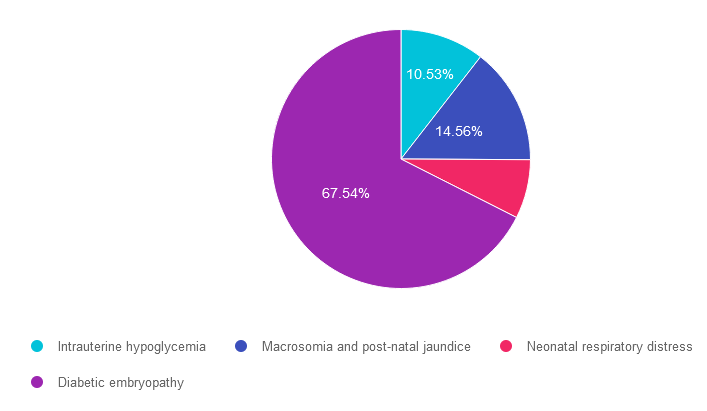
For last week’s practice question, we quizzed participants on gestational diabetes & pregnancy complications. 68% of respondents chose the best answer. We want to clarify and share this important information, so you can pass it on to people living with diabetes and your colleagues, plus prepare for exam success!
Before we start though, if you don’t want any spoilers and haven’t tried the question yet, you can answer it below: Answer Question
Question: AR has PCOS type 2 diabetes and worried because they just discovered they are 6 weeks pregnant. AR takes metformin 1000mg BID plus empagliflozin (Jardiance) 25 mg and their most recent A1C is 8.6%.
Which of the following is a potential complication associated with hyperglycemia during the first 10 weeks of pregnancy?
Answer Choices:
- Intrauterine hypoglycemia
- Macrosomia and post-natal jaundice
- Neonatal respiratory distress
- Diabetic embryopathy

Getting to the Best Answer
If you are thinking about taking the certification exam, this practice test question will set you up for success. Test writers anticipate possible answers based on the details in the question. They will wave those “juicy answers” right under your nose. Your job is to weed through the particulars, pluck out the most important elements and choose the BEST answer.
Answer 1 is incorrect. 10.53% chose this answer. “Intrauterine hypoglycemia.” Although this answer is tempting, it is not accurate. If the fetus experienced elevated blood sugars (from mom) during gestation, this stimulates increased fetal production of insulin. After delivery, baby’s who were exposed to intrauterine hyperglycemia are at higher risk of post-delivery hypoglycemia (not intrauterine hypoglycemia).
Answer 2 is incorrect. 14.56% of you chose this answer. “Macrosomia and post-natal jaundice.” Although this answer is tempting, it is not accurate. If the fetus experienced elevated blood sugars (from mom) during their first 10 weeks of gestation, this stimulates increased fetal production of insulin and can stimulate extra fat stores later in pregnancy leading to larger babies and higher risk for post delivery jaundice. However, the question is asking, what complications can elevated blood sugars cause during their first 10 weeks of pregnancy when the organs are developing?
Answer 3 is kind of incorrect. About 7.37% of respondents chose this. “Neonatal respiratory distress.” The question is asking, if the fetus experienced elevated blood sugars (from mom) during the first 10 weeks of gestation, what complications can elevated blood sugars cause during the first trimester pregnancy when the organs are developing? The lungs can be affected by first trimester hyperglycemia, causing the newborn to struggle with respiratory distress.
Finally, Answer 4 is correct. 67.54% chose this answer. “Diabetic embryopathy.” GREAT JOB. This is the best answer. If the fetus experienced elevated blood sugars (from mom) during the first 10 weeks of gestation, embryonic complications result from elevated blood sugars during the first trimester pregnancy when the organs are developing. These can include, congenital heart disease, renal anomalies and caudal regression.
We hope you appreciate this week’s rationale! Thank you so much for taking the time to answer our Question of the Week and participate in this fun learning activity!
Want to learn more about this question? Enroll in our
Level 2 | Pregnancy & Diabetes
Pregnancy with diabetes is confronted with a variety of issues that require special attention, education, & understanding. This course reviews those special needs while focusing on Gestational Diabetes & Pre-Existing Diabetes. Included are the most recent diagnostic criteria, management goals, & prevention of complications during pregnancy. This is a helpful review for Certification Exams & those who want more information on people who are pregnant & live with diabetes.
Objectives:
- List three issues that affect pregnancy with diabetes.
- Describe the unique attributes of pre-existing diabetes in pregnancy & gestational diabetes.
- State the diagnostic criteria & management goals for gestational diabetes.
- Potential short-term & long-term complications of fetal exposure to hypoglycemia.
- Prevention measures to keep mother & baby healthy.
Intended Audience: A great course for healthcare professionals seeking to enhance their knowledge of the issues surrounding pregnancy and diabetes and appropriate care to improve outcomes.
Level 2 | Hospitals & Hyperglycemia
Research clearly demonstrates the importance of glucose control during hospitalization to improve outcomes not only in the inpatient setting but after discharge. This course reviews the evidence that supports inpatient glucose control & outlines practical strategies to achieve targets in the inpatient setting. We incorporate the latest American Diabetes Association’s (ADA) Standards of Medical Care in Diabetes & provide links to resources & inpatient management templates.
Objectives:
- Describe the impact of hyperglycemia in the hospital setting.
- Discuss the importance of inpatient glucose control.
- List three strategies to get glucose to goal in the hospital setting.
Intended Audience: A great course for healthcare professionals seeking strategies to manage and improve inpatient diabetes care.









